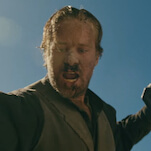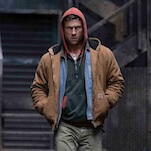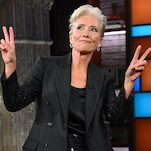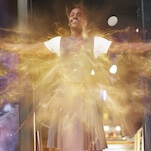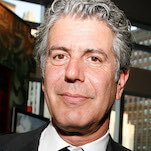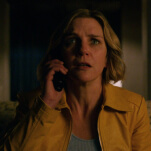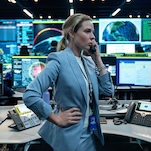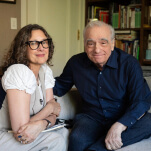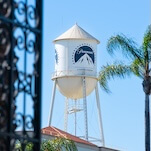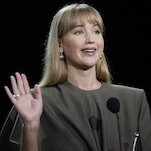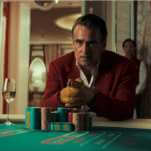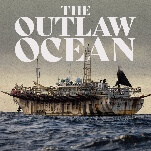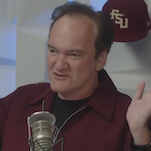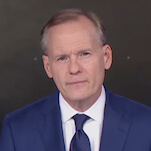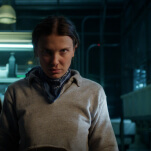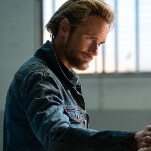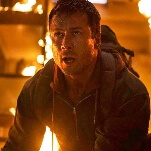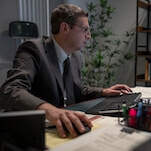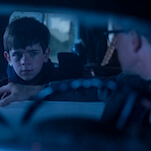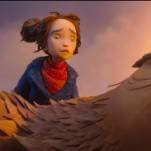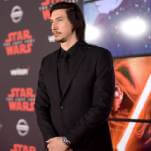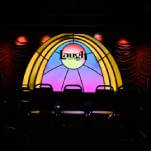There’s a bit of internet folk wisdom, frequently (and incorrectly) attributed to Margaret Atwood, which reads, “Men are afraid women will laugh at them. Women are afraid that men will kill them.” Unverifiable or not, that’s a terrifying reality to live with. But it must be lived with, and it must be processed in one way or another if you’re ever going to leave the house again.
Personally, I find comfort in seeing my fears transformed into literal monsters within the confines of horror movies and feel temporary relief when the “final girl”—a term coined by feminist scholar Carol J. Clover in 1992—finally makes her way to safety. I know this isn’t a “normal” response; for those without a certain morbid sensibility, tiptoeing up to death and poking it in the eye might seem like celebrating violence, rather than a self-imposed form of exposure therapy. Not everyone gets it. That’s why it’s so painful when genre movie events, the place where we go to dance with primal terrors in the dark, become yet another risk to navigate.
Among the horror-movie fans who are supposed to be “my tribe,” I’ve been overlooked, condescended to, talked over, and viewed with skepticism more times than I can count. I’ve had innocent interactions with fellow “fans” turn threatening online, and at one horrible screening, I felt a strange hand brush up against my knee in a dark theater, then slowly start to move up my thigh. I didn’t scream, and I didn’t get up to find a manager. I just turned my body away as far as I could, wishing that I could fold in on myself and disappear. I can’t explain why, except that I was afraid.
I never talked about that awful real-life creeping hand until last week, when it came up in one of the many conversations about sexual assault, harassment, and discrimination that took place at this year’s Fantastic Fest. Now in its 13th year, Fantastic Fest is the United States’ largest genre film festival, held every September at the flagship location of Austin-based theater chain Alamo Drafthouse. This year, the festival was dampened not only by literal storm clouds that hung over the theater for much of the week but also by a controversy that kept building as the festival wore on.
Mere weeks before this year’s Fantastic Fest was to begin, a byline in the festival program revealed that Devin Faraci, the former editor of Alamo-adjacent movie site Birth.Movies.Death., had been re-hired as a festival copywriter less than a year after being forced to step down amid charges of sexual assault. The directive to bring back Faraci had come directly from Alamo founder Tim League, who had built up much PR goodwill earlier in the year by mocking MRA trolls who opposed the theater’s all-female screenings of Wonder Woman. Worse still, League had asked one of the women who had reported Faraci to “[keep] this dialogue between us” for the sake of the “brand.”
I was bewildered and angry at the news—angry for everyone I knew who was having just as much trouble paying their rent as Devin Faraci was, but who weren’t being given a single chance, let alone a second one. Why couldn’t Devin go get a temp job? Why couldn’t he wait tables or work in a call center? What was so irreplaceable about this guy, except that he was powerful and had powerful friends? It confirmed every sneaking doubt I’d ever had, every fatalistic conclusion that I would always have to work twice as hard to get half of what my male peers did, simply because the boys’ club was, well, for boys.
All of this was on my mind the week before the festival, as I lay in bed after a screening of American Assassin and tried to figure out what to do. Some were calling for a boycott of the festival, but to me the idea of protesting a festival that marginalizes women by taking myself, a woman, out of the picture didn’t make sense. To quote Pajiba’s Kristy Puchko, who wrote a thoughtful piece on her experience at the festival, “I thought on what difference I could make there. I considered how women’s voices are underrepresented in film criticism and at film festivals. By boycotting, I would be cutting one more female voice out of this equation.”
So I decided to take up space. I decided to go and support the filmmakers, especially the female ones, who rely on festivals to get their work seen and talked about. I decided to do what I’ve done many times in the past: turn to my fellow female genre journalists, many of whom I met for the first time at Fantastic Fest, for support. Along with another writer, LA Weekly’s April Wolfe, I organized a meetup for female-identified and nonbinary members of the press corps that soon expanded to include industry people, filmmakers, and longtime attendees as well. The meetup, which filled several rooms of my Airbnb, was not sanctioned by the festival and did not have official festival representatives in attendance. (As word spread, we were contacted by festival staff, who expressed interest in hearing what we had to say. Notes are being delivered to festival management this week.)
I can’t divulge exactly what we talked about in that rented living room on the first day of the festival, or at the follow-up meeting at a breakfast joint a week later, because I promised not to. But I can say that profound hurt and righteous anger were expressed, along with a renewed commitment to solidarity and perseverance in the face of the systemic sexism all of us had experienced. Women also talked about feeling misunderstood and unheard, particularly online, where issues that were complicated and deeply personal to many of those in the room had been reduced to black-and-white “you’re with us or against us” talking points.
This feeling intensified later in the week, after what many in Austin had already known—that Ain’t It Cool News’ Harry Knowles was a serial harasser and assaulter—finally appeared in print. I’ve never met Knowles, thank goodness, and never read his site, so it was easy for me to say, “Fuck him, and fuck that website.” But on the ground, even this was more nuanced than it seemed: A woman covering the festival for Ain’t It Cool News sat quietly typing in the press room, still doing her job, forgotten even by those who claimed to advocate on her behalf. Then a secret screening of a softcore Ed Wood movie brought up valid criticisms from attendees about how films are presented at Fantastic Fest, a dialogue that was muddied by misinformation about the film on social media.
For a couple of heady days, women at Fantastic Fest had a choice: Take on the heavy, draining emotional labor of helping others at the festival—not to mention on “Film Twitter”—process their feelings about the actions of men most of us barely knew, or refuse this burden and be castigated for daring to enjoy ourselves. It was a no-win situation. (As Suki-Rose Simakis put it in her festival diary for Indiewire, “it is unfair to expect every woman and ally here to only engage with the festival in a self-flagellating joyless bummer fest, but more importantly, it’s unproductive.”) From what I saw, much of the emotional labor of publicly mourning for the innocence lost at Fantastic Fest this year was performed by women, like executive director Kristen Bell’s statement to attendees on opening night and the heartfelt, tearful speech festival social media director and current Birth.Movies.Death. editor Meredith Borders gave before annual trivia competition Fantastic Feud (in which, full disclosure, I participated back in 2015).
It’s for women like Meredith—who has been making a concerted effort to diversify Birth.Movies.Death. in her year as editor—that I went to Fantastic Fest this year, and it’s for them that I will keep working to expand my efforts beyond the small circle of journalists to whom I initially turned for help. And this is just the beginning of a larger conversation; one thing that haunted me throughout the week—and in the writing of this piece—is the repeated invocation of “women” in a space that’s overwhelmingly white and straight. Intersectionality is important, and efforts to organize people of color and LGBTQ people in film communities are equally vital and necessary.
League’s initial apology/explanation about why he re-hired Faraci spoke of redemption and rehabilitation. He said that Faraci had gotten help for his alcoholism and was trying to become a better person. I wish Faraci, who I’ve briefly met on a couple of occasions, luck on that journey. I also hope he realizes now that no one is entitled to being a film critic and that he can’t erase everything he said and did by blaming it on alcohol.
The people I talked to at Fantastic Fest who knew Tim League expressed anger and disappointment with his actions, but hope that he would take the criticisms leveled against him to heart. League, who I met in passing once, was absent from Fantastic Fest this year, as he should have been, and should be for a few years more. If he’s learned anything from all of this, he should learn that these things take time. League returning to Fantastic Fest 12 months from now without any real structural changes at the Alamo would be as misguided as Faraci quietly re-appearing in the festival guide 11 months after his own public reckoning.
At this point, I don’t know if I’ll be going back to Fantastic Fest next year. I’d love to be able to attend with clear eyes and a joyful heart, but these are early days, and sustained progress still needs to be made. But I do know that it’s only by putting women, queer people, and people of color in positions of real decision-making power and influence that we can begin the incremental work of changing film culture. (The new Fantastic Fest board of directors, headed by Bell, that League set up last week is a good start.) And that work will continue long after the headlines about Harry Knowles, Devin Faraci, and Tim League fade. As we dive into this process, I ask you to please look beyond those headlines and see, listen to, believe, and amplify marginalized people, whether it’s at the Alamo Drafthouse or your hometown movie theater. We all love to sit in the dark, but the lights must come up eventually.

